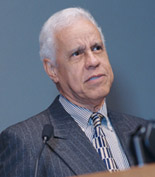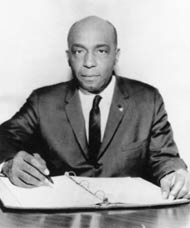
Lawrence Douglas Wilder is an American lawyer and politician who served as the 66th governor of Virginia from 1990 to 1994. He was the first African American to serve as governor of a U.S. state since the Reconstruction era, and the first African American ever elected as governor. He is currently a professor at the namesake Wilder School at Virginia Commonwealth University.

The United States District Court for the Eastern District of Virginia is one of two United States district courts serving the Commonwealth of Virginia. It has jurisdiction over the Northern Virginia, Hampton Roads, and Richmond metro areas and surrounding locations with courthouses located in Alexandria, Norfolk, Richmond and Newport News.
Massive resistance was a strategy declared by U.S. senator Harry F. Byrd Sr. of Virginia and his son Harry Jr.'s brother-in-law, James M. Thomson, who represented Alexandria in the Virginia General Assembly, to get the state's white politicians to pass laws and policies to prevent public school desegregation, particularly after Brown v. Board of Education.
Robert Reynold Merhige Jr. was a United States district judge of the United States District Court for the Eastern District of Virginia who was known for his rulings on desegregation in the 1970s.
Richmond Public Schools is a public school district located in the independent city of Richmond, Virginia. It is occasionally described locally as Richmond City Public Schools to emphasize its connection to the independent city rather than the Richmond-Petersburg region at large or the rural Richmond County, Virginia.

Oliver White Hill Sr. was an American civil rights attorney from Richmond, Virginia. His work against racial discrimination helped end the doctrine of "separate but equal." He also helped win landmark legal decisions involving equality in pay for black teachers, access to school buses, voting rights, jury selection, and employment protection. He retired in 1998 after practicing law for almost 60 years. Among his numerous awards was the Presidential Medal of Freedom, which U.S. President Bill Clinton awarded him in 1999.

Jackson Ward, previously known as Central Wards, is a historically African-American district in Richmond, Virginia, with a long tradition of African-American businesses. It is located less than a mile from the Virginia State Capitol, sitting to the west of Court End and north of Broad Street. It was listed as a National Historic Landmark District in 1978. "Jackson Ward" was originally the name of the area's political district within the city, or ward, from 1871 to 1905, yet has remained in use long after losing its original meaning.

Spottswood William Robinson III was an American civil rights lawyer, jurist, and educator who served as a United States circuit judge of the United States Court of Appeals for the District of Columbia Circuit from 1966 to 1989. He previously served as a U.S. district judge of the United States District Court for the District of Columbia from 1964 to 1966.
Raphael Benjamin West was an American attorney and politician who served as mayor of Nashville from 1951 to 1963, and as a Tennessee state senator from 1949 to 1951. While a state senator, he supported a change from at-large to single-member district voting to the Nashville City Council. This broadened representation on the council, enabling the African-American minority to elect candidates of their choice; women also gained seats on the council.
Green v. County School Board of New Kent County, 391 U.S. 430 (1968), was an important United States Supreme Court case involving school desegregation. Specifically, the Court dealt with the freedom of choice plans created to avoid compliance with the Supreme Court's mandate in Brown II in 1955. The Court held unanimously that New Kent County's freedom of choice plan did not adequately comply with the school board's responsibility to determine a system of admission to public schools on a non-racial basis. The Supreme Court mandated that the school board must formulate new plans and steps towards realistically converting to a desegregated system. Green v. County School Board of New Kent County was a follow-up of Brown v. Board of Education.

James Taylor Ellyson was a former Confederate soldier, as well as Virginia lawyer and Democratic politician, who served in several positions in his native Richmond, Virginia and statewide.

George Carroll was an American lawyer and civic figure, based in Contra Costa County, California. He served as the first black lawyer as well as the first African American to be elected to city council in Richmond. He later became the first black mayor of any large American city.

Samuel Wilbert Tucker was an American lawyer and a cooperating attorney with the National Association for the Advancement of Colored People (NAACP). His civil rights career began as he organized a 1939 sit-in at the then-segregated Alexandria, Virginia public library. A partner in the Richmond, Virginia, firm of Hill, Tucker and Marsh, Tucker argued and won several civil rights cases before the Supreme Court of the United States, including Green v. County School Board of New Kent County which, according to The Encyclopedia of Civil Rights In America, "did more to advance school integration than any other Supreme Court decision since Brown."
Benjamin Joseph Lambert, III was an American optometrist, community leader and politician. A Democrat, Lambert served for more than three decades in both houses of the Virginia General Assembly, initially in the Virginia House of Delegates and then in the Senate.

Henry G. Marsh was a Democratic politician from Michigan who served as Mayor of Saginaw, and was the first African-American to hold that office. Marsh was one of the first black mayors in the United States.
John Baker Boatwright was Virginia lawyer and member of the Virginia House of Delegates representing Buckingham, Appomattox and Cumberland Counties for 38 years beginning in 1922. A member of the Byrd Organization, Boatwright became a leader of its Massive Resistance to racial integration.
William Francis Stone was Virginia lawyer and member of the Virginia General Assembly representing Martinsville as well as Patrick and Henry Counties between 1954 and 1957, first as a delegate and then elected to a partial senate term in a special 1957 election upon the death of Frank P. Burton. A member of the Byrd Organization, Stone was a member of the Boatwright Committee which investigated the NAACP as part of the Massive Resistance to racial integration vowed by U.S. Senator Harry F. Byrd after the U.S. Supreme Court decisions in Brown v. Board of Education.
Earl Abbath Fitzpatrick was a Virginia lawyer and member of the Virginia General Assembly representing Roanoke between 1940 and 1959, first as a delegate and then as a state Senator. A lieutenant in the Byrd Organization, Fitzpatrick was active in the Massive Resistance to racial integration vowed by U.S. Senator Harry F. Byrd after the U.S. Supreme Court decisions in Brown v. Board of Education. He introduced much of the segregationist legislation and was vice-chairman of the Boatwright Committee which investigated the NAACP for litigating on behalf of civil rights, before being defeated in the 1959 Democratic primary.

Martin Armstrong Martin was an American criminal and civil rights attorney from Danville, Virginia who became the first African American trial attorney in the United States Department of Justice on May 31, 1943. He also became known for his appellate work for Odell Waller in 1942 and the Martinsville Seven in 1950-1951, and as a partner with Oliver Hill and future federal judge Spottswood Robinson in a law firm which assisted the National Association for the Advancement of Colored People in civil rights litigation in Virginia.
Edward Emerson Lane was a Virginia lawyer and politician. As a Democrat, Lane represented Richmond, Virginia in the Virginia House of Delegates from 1954 until 1978, and also was his party's (unsuccessful) candidate for Attorney General of Virginia in 1977.









